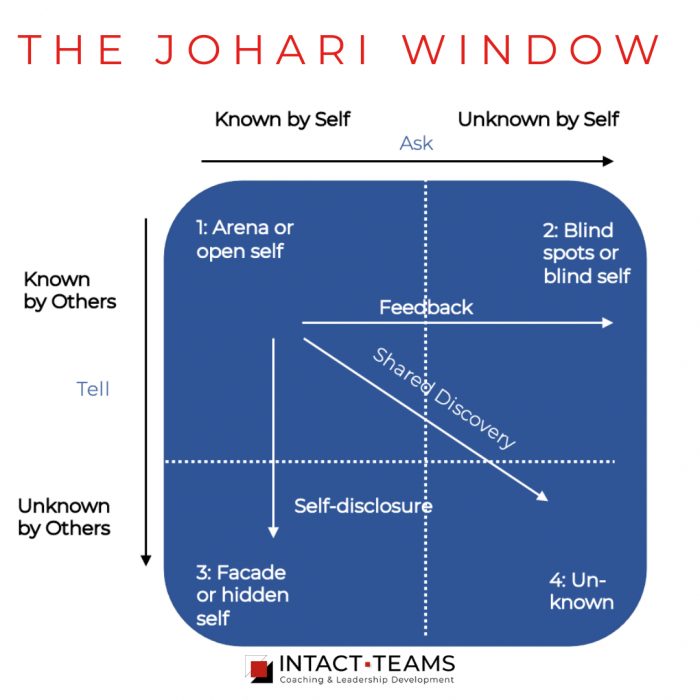Leading people comes down to two things: Relationships and Conversations. Even when we look at cohesive teams, it is clear that their performance is directly correlated with the quality of the conversations and relations between team members. And we know that open conversations where productive conflict is encouraged require trust. How can we build trust? One effective way is through self-disclosure and feedback.
I was working with a young leader in Sydney who had been promoted into a new role leading a team 6 analysts. Leading people was new to him and he found it challenging to connect with his team. During our coaching sessions it became clear that there was a lack of dialogue, collaboration and trust. In fact, he knew very little about his team members and he seemed to lack self-awareness. Conversations and meetings were factual and one way. Being rather shy and introvert, the people part of his role didn’t come easy to him, but he was open to learn and change. He started having regular casual one on one catch ups with his team members and taking an interest in their personal lives and shared more of his too. He also changed his meetings to being more open and team driven with check-ins, wellbeing moments and feedback sessions. A 360-feedback review helped him to learn where his own blind spots with the team were. It didn’t happen overnight but the relationship with his team and other stakeholders improved exponentially over time. Checking in after 12 months, things were very different, and he was leading a strong and connected team.
Self-disclosure and Trust
Self-disclosure is an important leadership trait because it relates directly to trust. When exploring self-disclosure with leaders, I often find that they either think they are open and transparent, but the team’s feedback shows they aren’t, or they don’t understand why self-disclosure is important in the first place. Research shows that self-disclosure, in fact, is an important part of connecting with people and gaining their trust. If you want people to trust you, they need to know who you are. That doesn’t mean you have to reveal your most private secrets and lay your personal life bare. It’s about communicating with people how feel about situations, explain decisions, tell people your values, what you stand for and what you don’t stand for, share experiences and relevant anecdotes. It’s about letting people see what is at the bottom of the iceberg.
I often use the Johari Window as a visual model for leaders to explore the areas of self-disclosure and feedback in order to put strategies and steps into place to build trust:

The model was created by psychologists Joseph Luft and Harrington Ingham in 1955 and named after their first names. It is called a window as it serves as a window and the view others have of you and into you. The aim is to widen the Arena windowpane as here the most effective relationships take place. So if you are the window, what do the panes stand for:
Arena or open self:
Here is the information about you, your attitude, behaviour, emotions, feelings, skills and views that are known by you as well as by others. As you can see in the model, this area should be the biggest one and the aim is to increase it and make the other panes smaller. The larger the arena becomes the more effectual and dynamic your relationship will be.
Blind spots or blind self:
Here are the aspects that others notice and know about you that you are unaware of. Others may have a different perception of you and interpret your actions in a different way. The blind spot can be reduced by asking for feedback from others.
Façade or hidden self:
Here is the information that is known to you but hidden from others. Often these are personal stories, feelings, fears or past experiences. You don’t have to reveal your most private secrets, as a matter of fact, there is oversharing that can damage your relationships or career. But you have to consider shifting this window by disclosing more about yourself to build trust. People need to know who you are to be able to trust you.
Unknown
In this area you find the information that is unknown to you as well as others. Your blind spots that others also don’t see. The more you shift your blind spots and façade the smaller this window pane becomes. It can also be achieved by shared discovery and dialogues where both parties discover hidden talents and capabilities or what is holding you back. Open communication and coaching is an effective way to decrease the unknown.
3 tips to increase your Arena:
- Ask for Feedback. Make this a habit. Ask for feedback at the end of meetings, when you deliver your word, at the end of a conversation. Ask your clients, your teams, your peers and your leaders. A 360 feedback process is very powerful
- Self-disclosure. Think about what people want to know about you. What helps them to understand you better and trust you? Share your stories, experiences, how you feel intentionally.
- Shared Discovery. Use a coaching approach and dialogue. Open up your communication so that both parties can discover hidden talents or blind spots. Powerful questions, reflection and self-awareness help.
My client used both, feedback loops and self-disclosure to increase his arena which in turn increased the level of trust in his team.
If you want to work with me, contact me on info@intactteams.com








